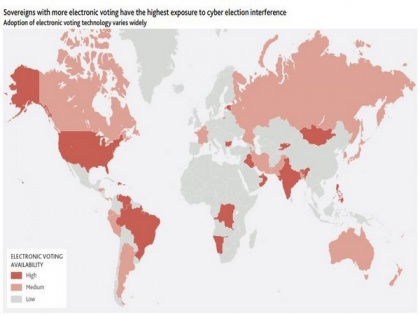Cyber interference in elections raises sovereign risk: Moody's
By ANI | Published: July 13, 2020 10:42 AM2020-07-13T10:42:57+5:302020-07-13T10:55:12+5:30
Cyber attackers are increasingly targeting the electoral process in many countries with the potential for impeding policymaking and damaging a sovereign's creditworthiness, Moody's Investors Service said on Monday in its latest credit outlook.

Cyber interference in elections raises sovereign risk: Moody's
Cyber attackers are increasingly targeting the electoral process in many countries with the potential for impeding policymaking and damaging a sovereign's creditworthiness, Moody's Investors Service said on Monday in its latest credit outlook.
Interference tactics include not only technical intrusions that alter results or prevent voting but also social media disinformation attacks. Governments with strong legislative and executive institutions are best placed to defend the electoral process and mitigate the impact of successful attacks.
Still, even sovereigns with the strongest institutions are increasingly likely targets of cyber election interference and are not immune to the related risks, said Moody's.
Increased digitisation of elections has led to rising cyber risks for sovereigns that hold popular elections. Cyber threats to elections have increased as the targets for election hacking have multiplied to encompass voting machines, election information technology infrastructure and social media platforms.
The amount of digitisation, however, varies around the world.
Cyber election interference has potential to impede policymaking. Cyber interference that exacerbates sociopolitical tensions or disrupts the stability and functioning of institutions and governance could hinder or delay policymaking.
In such cases, credit-negative economic or political developments or both could result.
Strong institutions and governance can mitigate but not eliminate credit risks related to cyber election meddling. Through proper planning and resource allocation, sovereigns can prevent many forms of cyber interference and detect and respond more effectively when it occurs.
However, strong institutions and governance are not guarantees against cyber election interference.
Moody's also said that coronavirus pandemic will disrupt elections in the coming months. The pandemic will pose challenges to elections around the world.
Most countries hold in-person elections in which voters cast votes at polling stations but such large gatherings can also lead to the spread of the virus. Election orgsers will wrestle with determining how to adhere to social distancing directives without disenfranchising voters.
Worldwide, at least 67 countries and territories have postponed planned national and sub-national elections because of the pandemic since February 21 while at least 44 went ahead with them.
From a cyber perspective, the disruption of established processes often enables malicious cyber activity. Initiatives to adopt vote-at-home paper ballot solutions will diminish the risk from electronic vote casting machines.
However, unless officials conduct vote tallying by hand, the process will remain vulnerable to cyber interference, said Moody's.
( With inputs from ANI )
Open in app